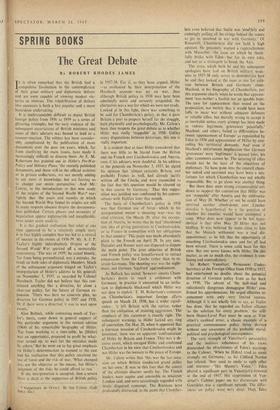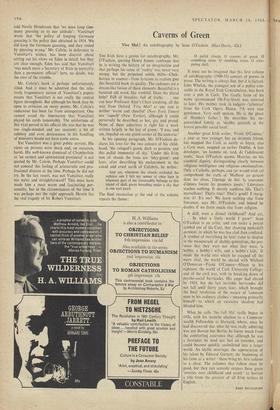SPRING BOOKS The Great Debate
By ROBERT RHODES JAMES
P is often remarked that the British find a Icompulsive fascination in the contemplation of their great military and diplomatic defeats and are even capable of viewing modest vic- tories as reverses. The rehabilitation of defeats into successes is both a less popular and a more hazardous undertaking.
It is understandably difficult to depict British foreign policy from 1936 to 1939 as a series of glittering triumphs, but the very violence of the subsequent excoriations of British ministers and some of their advisers was bound to lead to:a counter-reaction. The subject has been consider-. ably complicated by the publication of more documents over the past ten years. which, far from clarifying the main issues, have made .it increasingly difficult to discern them. As E. M. Robertson has pointed out in Hitler's Pre-War Policy and Military Plans. `the recently published documents, and those still in the official archives or in private collections, are not merely adding to our store of knowledge, but are forcing us to change our entire perspective.' And Mr. Colvin, in the introduction to this new study of the origins of the Second World War,* says rightly that 'the years and months in which the Second World War found its origins are still in many respects obscure despite the documenta- tion published. Certain phases and moments of negotiation appear nightmarish and inexplicable, even under acute analysis: It is this gradual realisation that what at one, time appeared to be a relatively simple story is in fact highly complex that has led to a revival of interest in the events of 1936-39. Mr. A. J. P. Taylor's highly individualistic Origins of the Second World War sparked off a memorable controversy. 'The war of 1939.' he stated bluntly, 'far from being premeditated, was a mistake, the result on both sides of diplomatic blunders. Much of the subsequent argument hinged on Taylor's interpretation of Hitler's address to his generals on November 5, 1937, as recorded by Colonel Hossbach. Taylor did not believe that this con- stituted anything like a directive, let alone a clear-cut policy, for the future of German ex- pansion. 'There was here no concrete plan, no directive for German policy in 1937 and 1938. Or if there were a directive, it was to wait upon events.'
Alan Bullock, while contesting much of Tay- lor's thesis, came down in general support of this particular argument in the revised edition (1964) of his remarkable biography of Hitler. 'Far from working to a time-table, he [Hitler] was an opportunist, prepared to profit by what- ever turned up, to wait for the mistakes made by others.' But he went on to lay great emphasis on Hitler's determination to expand to the east and his realisation that this policy involved the use of force and the risk of war. 'What changed was not the objective or the means, but Hitler's Judgment of the risks he could afford to run.'
If this interpretation is accepted. then a severe blow is dealt at the supporters of British polity
* VANSI1TART IN Orru 1,. By Ian Colvin. (G41,. lane/. 42s.)
in 1937-38. For if, as they have argued, Hitler —as evidenced by their interpretation of the Hossbach account—was set on war, then although British policy in 1938 may have been admittedly naive and seriously misguided, the alternative was a war for which we were not ready. Looked at in this light, there was something to be said for Chamberlain's policy, in that it gave Britain a year to prepare herself for the struggle, both physically and psychologically. Mr. Colvin's book thus reopens the great debate as to whether Hitler was really 'stoppable' in 1938. Unlike many disputations between historians, this one is really important.
It is evident that at least Hitler considered that there was little to be feared from the British and the French over Czechoslovakia and Austria, even if his advisers were doubtful. In his address to the generals on November 5, 1937, he stated his 'opinion that 'almost, certainly Britain, and probably France as well, had already tacitly written off the Czechs and were reconciled to the fact that this question would be cleared up in due course by Germany.' That this suppo- sition was justified was confirmed by his conver- sations with Halifax later that month.
The basis of Chamberlain's policy in 1938 was that German use of force---which in his interpretation' meant A shooting war—was the vital criterion. On March 20, after the occupa- tion of Austria, he wrote that he had 'abandoned any idea of giving guarantees to Czechoslovakia, or to France in connection with her obligations to that country.' This point was made abundantly plain to the French on April 28. In any case, Daladier and Bonnet were not disposed to dispute the main point. The joint objective of British and French policy was henceforward to extract concessions from the Czechs rather than to re- strain Germany. The shooting war was the night- mare, not German 'legalised' aggrandisement.
As Bullock has stated, 'however sincere Cham- berlain's desire to reach a settlement with Germany, in practice it amounted to an invita- tion to diplomatic blackmail which Hitler was not slow to exploit.' E. M. Robertson's comment on Chamberlain's important foreign affairs speech on March 24, 1938, has a wider signifi- cance: 'it left Britain with the option, rather than the obligation, of resisting aggression.' The emphasis of this statement is exactly right. The subsequent warnings to Hitler lacked any ring of conviction. On May 20, when it appeared that a German invasion of Czechoslovakia might be imminent, there was an apparent 'confrontation'
of Hitler by Britain and France. This was a de- cisive event, which enraged Hitler and confirmed Chamberlain in his view that Czechoslovakia and
not Hitler was the menace to the peace of Europe.
Mr. Colvin writes that 'this was the last occa- sion on which Britain conducted grand policy on her own.' It was in this fact that the source of the ultimate disaster surely lay. The French leaders were supine and amenable to whatever London said, and were accordingly regarded with thinly disguised contempt. The Russians were profoundly distrusted, to the point that Chatnber- lain even believed that Stalin was 'stealthily and cunningly pulling all the strings behind the scenes to get us involved in war with Germany.' Of Roosevelt, Chamberlain did not 'hold a high opinion. He genuinely wanted a rapprochement with Mussolini—the issue on which he thank- fully brake with Eden--but for its own sake, and not as a stratagem to break the Axis.
The stress which both he and his subsequent apologists have laid on British military weak- ness in 1937-38 only serves to demonstrate hoW he and they looked at the issue as one for solu- tion between Britain and Germany alone. Macleod, in his biography of Chamberlain, put this argument clearly when he wrote that appease- ment 'was neither a foolish nor an ignoble hope. The case for appeasement thus rested on the proposition, not merely that it would have been folly to incur war without adequate defences or reliable allies, but morally wrong to accept it as inevitable unless every attempt has been made to redress legitimate grievances peacefully.' Macleod, and others, 'failed to differentiate be- tween 'appeasement of Europe' as expolinded by Eden in 1936 and appeasement of Hitler by con- ceding his. territorial demands.' And even if Macleod's unfortunate implication. that German 'grievances' were 'legitimate' is passed 'oiler, his other comments cannot be. The securing'Of allies should not be the least of the objectives of diplomacy. To have gone into the council cham- ber naked and unarmed may have been a mis- fortune for which Chamberlain was net wholly responsible. But to go alone was another thing.
But there does seem strong circumstantial evi- dence to support the contention that Hitler was not 'stoppable' after Austria and the confronta- tion of May 20. Whether or not he could have survived another 'climb-down. over . Czecho- slovakia is hypothetical. So is the question of whether his enemies would have attempted a coup. What does now appear to be leSS hypo- thetical is that after May 20 Hitler .was not bluffing. It was believed by some close to him that the Munich settlement was a real dis- appointment. as he felt that the opportunity of smashing Czechoslovakia once and for all had been missed. There is some solid basis for this view. But one never knows with Hitler. On this' matter, as on so much else, the evidence is con- fusing and contradictory.
Sir Robert Vansittart, Permanent Under- Secretary at the Foreign Office from 1930 to 1937, had entertained no doubts about the potential direction of German policy from as far back as 1930. The advent of 'the half-mad and ridiculously dangerous demagogue Hitler' con- firmed his apprehensions. He urged effective re- armament with only very limited 'success.
Although it is not wholly fair to say, as Taylor has done, that he regarded an Italian alliance 'as the solution for every problem,' the still- born Hoare-Laval Pact must be seen as Van- sittart's cardinal error, a classic example of a-- practical commonsense policy being devised without any awareness of the probable moral, political and psychological consequences.
The very strength of Vansittart's personality and the insistent vehemence of his views diminished the effectiveness of Eden's .warnings
to the Cabinet. 'When he [Eden] tried to speak strongly on Germany,' as Sir Clifford Norton
has related. 'they, used to smile to each other and murmur, "His Master's Voice."' Eden played a significant part in Vansittart's removal at the end of 1937. His suppression of Van- sittart's Cabinet paper on his discussions with Goerdeler was a significant episode. The differ- ences on policy went very deep. Thus, Eden
told Nevile Henderson that 'we must keep Ger- many guessing as to our attitude': Vansittart wrote that 'the policy of keeping Germany guessing is the policy that obtained in 1914. We did keep the Germans guessing, and they ended by guessing wrong.' Mr. Colvin, in deference to, Vansittart's wishes, has been discreet about setting out his views on Eden in detail, but they are clear enough. Eden has said that Vansittart 'was much more a Secretary of State in mentality than a permanent official'; here, no doubt, was the core of the trouble.
Mr. Colvin's book is perhaps unfortunately, titled. And it must be admitted that the rela- tively fragmentary nature of Vansittart's papers means that Vansittart is not really the central figure throughout. But although his book may be open to criticism on many points, Mr. Colvin's endeavour has been far from unimportant, One cannot avoid the impression, that Vansittart played his cards lamentably. The misfortune of this vital period in his official life was that he was too single-minded and too insistent; a bit of subtlety and even deviousness in his handling of ministers would not have come amiss.
Yet Vansittart was a great public servant. His views on persons were sharp and, on occasion, harsh. His well-known dismissal of Chamberlain as 'an earnest and opinionated provincial' is not quoted by Mr. Colvin. Perhaps Vansittart could not conceal this feeling of aristocratic and pro- fessional distaste at the time. Perhaps he did not try. In the last resort, was not Vansittart really too naïve and straightforward? This must have made him a most warm and fascinating per- sonality, but in the circumstances of the time it was perhaps not the right approach. Herein lies the real tragedy of Sir Robert Vansittart.















































 Previous page
Previous page